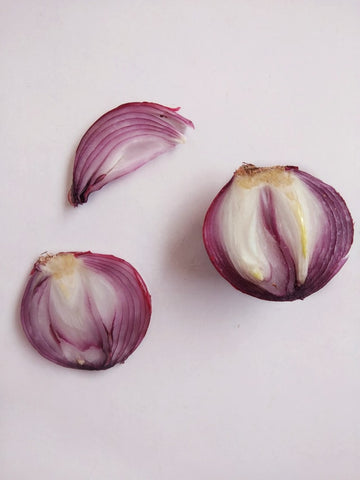Insomnia isn’t just annoying – it’s dangerous. In fact, a chronic lack of sleep impairs your ability to focus and concentrate just as much as alcohol.
But that’s not all. Insomnia is also known to increase your risk of heart disease, high blood pressure, diabetes, and even cancer!
If you’re having trouble falling asleep, the foods you’re eating may actually be to blame.
Your body and brain need to rest, relax, and restore while you sleep. The same is true for your digestive system.

If you eat too close to bedtime or you’re eating too many stimulating foods, your digestive system isn’t prepared to break all of it down.
As a result, you may experience acid reflux, bloating, or insomnia, meaning that your choice of bedtime snack can make or break your sleep!
If you want to fall asleep with ease, avoid the following seven foods that keep you awake before bed.
1. Spicy Foods
If you like to live life with a little spice, your favorite foods may be to blame for your inability to fall asleep with ease.
Spicy foods are known to cause heartburn, acid reflux, and indigestion.
These symptoms worsen when you lie down, as the acid from spicy foods may travel into the esophagus, leading to irritation that disturbs your sleep.
Spicy foods like chili peppers are also known to raise your core body temperature. An elevated core temperature is known to disrupt sleep by preventing you from cooling off and drifting off to bed.

The research doesn’t lie, either. A 2019 study of 440 medical students found that eating spicy foods before bed made it uncomfortable to lie down.
Elevated acid reflux caused by eating spicy foods was also shown to worsen sleep apnea.
Some of us have a higher tolerance for spicy foods, but that doesn’t mean eating them in excess or close to bedtime is a good idea.
If you have a zest for the spicier things in life, avoid eating spicy foods in the hours before you plan to turn into bed.
The same can be said for foods with high-fat content.
2. Foods With High-Fat Content
Healthy fats are an important part of balanced nutrition, but your positive dietary choices may literally keep you up at night if you overdo it!
If you tend to eat foods high in fat like avocados, nuts, cheese, or fatty fish, poor sleep may follow.
While there are several different types of fats, the two with the most research in connection with sleep disturbances are saturated fats and trans fats.
Saturated fats occur naturally in red meat and dairy. Trans fats are also found in red meat and dairy but can be created by adding hydrogen to vegetable oil as well.
Science shows that a diet higher in saturated fat is associated with less restorative, light sleep as opposed to more balanced nutrition.
A separate study found that a diet high in fats lowered the overall sleep time of over 450 women.

But the same is true for men. When researchers studied a group of 211 men in 2015, they discovered that men who suffered from insomnia had a higher saturated fat intake than those who had no sleep challenges.
Trans fats are also known to cause issues with falling and staying asleep, according to a 2016 study of over 15,000 men.
Why are the two correlated? Turns out, fatty foods can overwhelm the digestive system if eaten too close to bedtime.
As with spicy food, as the digestive tract attempts to slow, discomfort and acid reflux caused by fatty dishes may follow.
This doesn’t mean you should opt for different types of fatty foods like fried chicken, though. Stick to the healthy, balanced fats – just avoid consuming them too closely before bed.
While that may mean skipping your midnight snack of some delicious cheeses, your sleep quality will thank you for it.
3. Sugary Soups & Drinks
There is a proven association between reduced sleep quality and people who consume sugary beverages regularly.
When we hear the term “sugary drinks,” most of us tend to think of sodas or sports performance drinks.
However, you may be consuming much more sugar than you think…and some of it could be hidden in your food!

When thinking of sugar consumption, soup probably isn’t the first thing that comes to mind. But it should be!
While homemade, fresh soup is a great way to increase your hydration and vegetable consumption, many commercially available soups have tons of hidden ingredients that may not be as good for you.
Added sugars in your soup may be hidden under the names:
- Sucrose
- Dextrose
- Maltose
- High fructose corn syrup
- Barley malt
Opt for homemade soups or stews or be sure to read the labels on canned soups before purchasing.
@somnifix Our #digestive system needs to rest while we #sleep & these foods make it harder! #insomnia #learnontiktok #didyouknow #sleephygiene ♬ Cumbia Buena - Grupo La Cumbia
Aside from your soup selection, watch out for hidden sugars in pre-packaged fruit and fruit juice.
Canned fruit is a convenient way to add some extra vitamins and minerals to your diet. However, most pre-packaged fruit is swimming in sugary syrup designed to help preserve it.
There can be just as much sugar in canned fruit or fruit juice as a soda, contradicting the very reason you reached for the fruit to begin with.
The convenience of little to no preparation associated with canned or packaged fruit comes at the cost of your sleep hygiene.
Choose whole fruit or 100% fruit juice over sweetened pre-packaged fruit or fruit juices.
Much like sugar, caffeine is commonly hidden in many different foods and beverages, and you’ll toss and turn at the expense.
4. Foods and Medications With Hidden Caffeine
We all know better than to drink a cup of coffee before bed. But what if caffeine is hiding in your favorite snacks?
Dark chocolate is known for being rich in antioxidants, making it a powerful addition to any diet. That said, it contains even more caffeine than a cup of coffee, on average.

Even if you aren’t eating dark chocolate straight from the package, your favorite baked goods may have hidden chocolate packed with stimulating caffeine.
Like many people, you may supplement protein to ensure you’re getting enough each day for optimal health. If protein bars are part of your daily food intake, check if your favorite brand contains caffeine.
Moreover, certain medications could contain hidden amounts of caffeine. If you regularly take pain relief medication, be mindful of whether or not it lists caffeine as an active ingredient.
Much like caffeine, tyramine founds in fermented foods is known to stimulate brain activity, preventing you from winding down.
5. Fermented Foods Containing Tyramine
Some foods contain an ingredient called tyramine, which is an amino acid known to increase brain activity.
Tyramine is a byproduct of the breakdown of tyrosine known to help regulate blood pressure. High amounts of tyramine are known to cause negative side effects, like migraines and insomnia.
Fermented foods tend to have some of the highest levels of tyramine. If you’re snacking on too many fermented foods before bed, the tyramine could prevent you from falling asleep quickly.

Fermented foods that may contain tyramine include:
- Sour cream
- Aged cheeses
- Yogurt
- Sauerkraut
- Kimchi
- Pickled foods, such as pickled beets
- Tofu
- Miso
- Soy sauce
High levels of tyramine can also be found in certain citrus fruits, like grapefruits or tangerines.
Avoid fermented snacks and citrus fruits before bed to avoid the stimulating effects of tyramine. While you’re at it, lay off the onions, too.
6. Onions
If you’re an onion lover, bad breath and teary eyes aren’t the only things you have to worry about.
Onions are known to cause gas that may affect the pressure in your stomach, leading to acid reflux.
In fact, research has uncovered a direct link between raw onions and long-lasting feelings of reflux.

Skip the onion rings or extra onions on your burger at dinnertime to ensure that discomfort and heartburn don’t keep you up all night long.
If you simply can’t resist, grilling or sautéing your onions can help to lower their acidity, reducing your chances of discomfort.
Speaking of acidity, other foods high in acid content (like ketchup) have a reputation for leaving you restless by disrupting your sleep.
7. Ketchup and Pasta Sauce
When it comes to foods that keep you awake, acidic foods are known to cause trouble. Foods high in acidity cause heartburn and indigestion that may worsen upon lying down.
As we’ve already mentioned, the discomfort associated with heartburn, indigestion, and acid reflux is notorious for keeping you awake when you should be sleeping.
Ketchup is at the top of the list thanks to the acidity of the tomatoes used to make it along with chemicals commonly used to preserve it.

Pasta and marinara sauces can contribute to discomfort due to high acidity, too.
If you plan to eat ketchup or pasta sauce, opt to eat them at lunchtime rather than dinner time to prevent pesky acid reflux.
Now that you know what foods that keep you awake, you can steer clear of thembefore bed for improved sleep quality and lowered sleep disruptions.
However, what you choose to put in your mouth (or not) won’t necessarily solve all of your sleeping woes.
If you habitually breathe in and out of it instead of your nose, you may still experience sleep disruptions and challenges.
It’s Not Just What You Put IN Your Mouth…
Even if you avoid all of the foods that keep you awake by controlling what you put in your mouth, your mouth might still disrupt your sleep.
If you’re mouth breathing instead of nasal breathing, you’re more likely to experience snoring, fragmented sleep, and even sleep apnea.

Mouth breathing is over breathing and over time, it diminishes your health.
So how do you stop mouth breathing during sleep? The answer lies in mouth taping!
Mouth tape prevents mouth breathing, dry mouth, grogginess, and more. Before you grab some duct tape from your garage, pause!
Certain tapes contain harmful chemicals known to cause rashes and irritation.

SomniFix, however, is gentle on the skin. Our Mouth Strips offer a comfortable, breathable fit with a gel-like adhesive free from latex, gluten, and irritating chemicals.
You’ve learned to stop putting foods that keep you awake in your mouth before bed. Now, tape it up for improved airway health and sleep quality!



